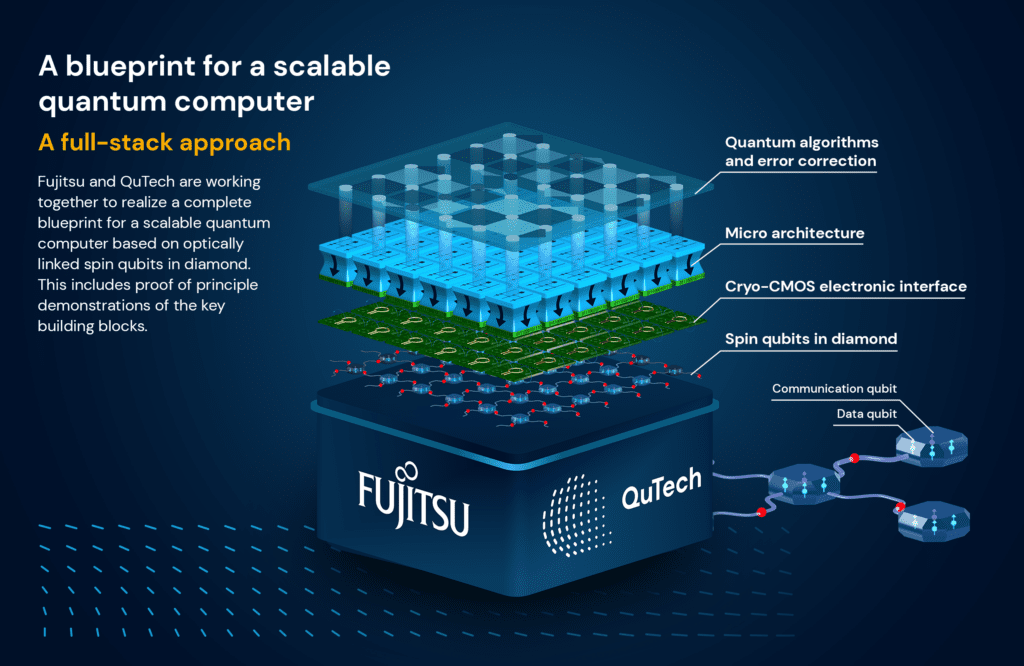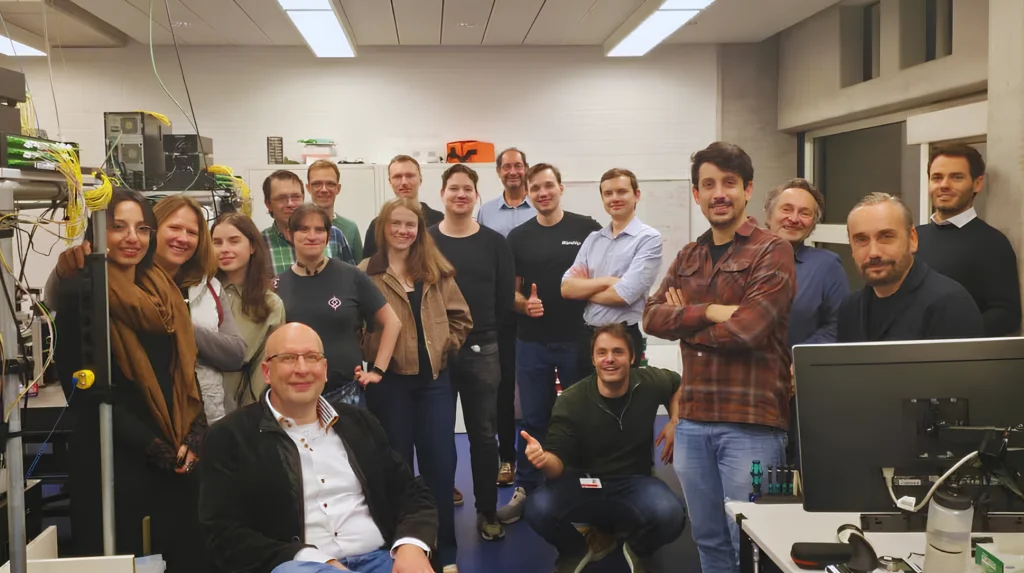Insider Brief:
- QuTech and Fujitsu are collaborating to create a scalable quantum computer blueprint, focusing on a full-stack approach that includes all critical components, from qubit modules to error-correction algorithms.
- The blueprint features advanced technologies such as high-quality qubits with extended coherence times, optical connections for modular communication, and cryo-CMOS electronics for efficient qubit control.
- This partnership aligns with Fujitsu’s long-term strategy as outlined in their 2024 Integrated Report to lead in quantum innovation and sustainability, and builds on past collaborations with QuTech.
PRESS RELEASE — QuTech and Fujitsu have recently announced a partnership to develop a blueprint for a scalable quantum computer. This collaboration is centered around delivering a comprehensive framework for building quantum computers that addresses all major components required for scalability and reliability. According to the announcement, the partnership takes a “full-stack approach,” which encompasses everything from physical qubit modules to high-level error-correction algorithms designed to stabilize quantum computations.
At the foundation of this blueprint are high-quality qubits with extended coherence times—vital for maintaining quantum states over longer computations—and optical connections between qubit modules, which support scalability by allowing individual modules to communicate seamlessly. This design is expected to lay the groundwork for building increasingly complex quantum systems as quantum technology advances.

Technological Layers: From Algorithms to Cryo-CMOS Electronics
The project comprises several specialized layers, each tackling distinct parts of the quantum computing stack. At the top layer, quantum algorithms and error correction play a central role, counteracting the inherent instability of qubits through error-correction codes. These codes are designed to maintain the integrity of quantum states, enabling complex problem-solving capabilities that could outperform classical systems in specific applications.
Beneath the algorithmic layer lies the micro-architecture, responsible for translating quantum computational logic into fine-grain digital control signals for the electronic interface. This functional abstraction provides an essential bridge, allowing the quantum instructions and error-correction codes to be communicated precisely to the quantum hardware.
The blueprint also incorporates cryo-CMOS electronics—a specialized type of circuitry capable of operating at cryogenic temperatures, in close proximity to the qubits. This technology leverages commercial semiconductor manufacturing techniques to fabricate circuits that manage magnetic fields, photon detection, and photonic controls essential for qubit manipulation. The use of cryo-CMOS electronics allows for faster, more efficient control by minimizing the distance between the qubits and their control systems.
On the hardware front, QuTech and Fujitsu are working with spin qubits hosted in diamond, known for their stability and durability. These qubits are organized in modules of five to ten qubits each and are connected through on-chip photonic integrated circuits, creating a modular setup conducive to scalable design. The ability to connect multiple modules allows the quantum computer to grow in power and capacity, a critical feature for achieving scalable quantum systems.
Strategic Goals Aligned with Fujitsu’s Broader Vision
This partnership aligns closely with Fujitsu’s 2023–2025 Medium-Term Management Plan, as outlined in their recently released 2024 Integrated Report. Fujitsu’s roadmap emphasizes the development of key technologies, including quantum computing, as part of a global strategy to advance practical, high-performance quantum solutions. The collaboration with QuTech exemplifies Fujitsu’s commitment to cover the entire spectrum of quantum technology—from quantum devices to software and applications. Fujitsu has also expanded its quantum research reach by working with leading institutions worldwide.
Additionally, Fujitsu’s Integrated Report highlights other forward-looking projects like the FUJITSU-MONAKA processor, designed with the ultimate goal to build a sustainable digital society. These broader ambitions reflect Fujitsu’s commitment to both the technological advancement as well as sustainable solutions.
A Legacy of Collaborative Innovation
This recent project builds upon a history of cooperation and shared acheivements between Fujitsu and QuTech. Earlier in 2024, Fujitsu and Delft University of Technology established the Fujitsu Advanced Computing Lab Delft, designed to advance quantum computing research and facilitate joint exploration with top scientists and emerging innovators. This hub, located at Delft, is part of Fujitsu’s global research initiative, which places researchers within leading universities to encourage technological development. Since the establishment of this collaboration, Fujitsu and QuTech have engaged in regular meetings and project updates, including a June 2023 progress review and exploration of further collaboration opportunities.
Through this blueprint, Fujitsu and QuTech will actively engage in advancing the hardware and software required for practical quantum system together, as well as establish a roadmap for the quantum computers of tomorrow, in hopes of providing a solution that can effectively handle increasingly complex computational demands.














